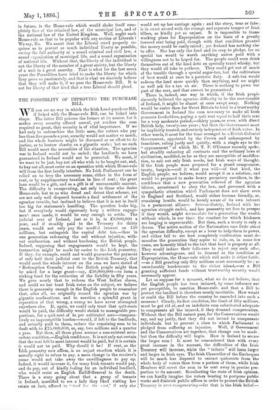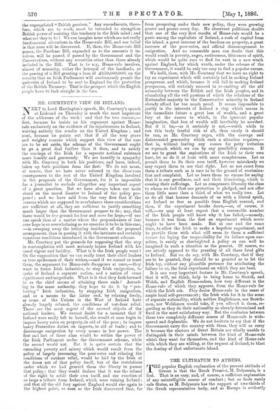THE POSSIBILITY OF IMPROVING THE PURCHASE BILL.
WE can see no way in which the Irish Land-purchase Bill, if linked with the Home-rule Bill, can be licked into shape. The latter Bill poisons the former at its source, for it makes every security offered unreal, yet renders the sum required so great, that security is of vital importance. If we had only to enfranchise the little men, the cotters who pay less than five pounds a year, security would not matter• so much, and the whole business might be discussed as an effort to do justice, or to bestow charity on a gigantic scale ; but no such Bill would meet the necessities of the situation. The agrarian war in Ireland would not be ended; the landlords we have guaranteed in Ireland would not be protected. We must, if we want to be just, buy out all who wish to be bought out, and, to buy out all, must enter on an operation with which Home-rule will from the first fatally interfere. No Irish Parliament can be relied on to levy the necessary sums, either in the form of rent, or by supplementary taxation in lieu of rent ; the great loan would be a gift, and as a gift is of unreasonable amount. The difficulty is exasperating, not only to those who desire Home-rule, but to us who dread and detest that scheme, yet are not only well disposed towards a final settlement of the agrarian trouble, but inclined to believe that it is not in itself too big for statesmen's handling. The question looks big, but if everybody would rigorously keep a written engage- ment; once made, it would be easy enough to settle. The judicial rent of Ireland, just as it is, is £9,000,000 a year, and if steadily paid to the Treasury for thirty years, would not only pay the needful interest on 150 millions, but extinguish the capital debt too,—thus in one generation redeeming the soil without injustice, with- out confiscation, and without burdening the British people. Indeed, supposing that engagements would be kept, the transaction might be made far easier to the Irish peasantry. If they, for example, could and would guarantee the payment of only half their judicial rent to the British Treasury, that would meet the whole interest on the sum we have stated of "Redemption Consols," and the British people might then be asked for a large grant—say, £30,000,000—to form a sinking fund for the extinction of the liability in fifty years. We gave nearly that to redeem the West Indian slaves, and could we but trust Irish votes on the subject, we believe there is generosity enough in the English people to remember that, after all, we originally roused the agrarian war by gigantic confiscations, and to sanction a splendid grant in reparation of that wrong, a wrong we have never attempted anywhere else. If, again, we could only trust that quit-rents would be paid, the difficulty would shrink to manageable pro- portions, for a quit-rent of 4s. per cultivated acre—compara- tively an imperceptible burden—would, if left to the landlords, and actually paid to them, reduce the remaining sum to be dealt with to £75,000,000, or, say, two millions and a quarter a year. But then, all these plans assume a non-existent ante- cedent condition,—English confidence. It is not only not certain that the rent left to meet interest would be paid, but it is certain it would not be paid. Why should it be ? If rent, as the Irish peasantry now affirm, is an unjust exaction which it is morally right to refuse to pay, a mere change in the receiver's name would not take away the unwillingness to pay up. Indeed, it would increase it, for many Irish tenants would pay, and do pay, out of kindly feeling for an individual landlord, who would resist an English Bailiff-General to the death. There is a story going about that a group of tenants in Ireland, mortified to see a lady they liked visiting her
estate on foot, offered to "lend Me ?int." if only she would set up her carriage again ; and the story, true or false. is in exact accord with the strange and separate temper of Irish tillers, so kindly yet so unjust. It is impossible to frame working plans for Expropriation on the basis of a greatly lowered rent being paid, though with that condition granted the money could be easily raised ; yet Ireland has nothing else to offer. She has only the land and its crop to pledge, for no• special tax would be worth anything unless paid with a willingness not to be hoped for. The people could soon drink themselves out of the land debt on specially taxed whisky, but they would all take to potheen. They could get out of much of the trouble through a special sugar-tax, but the cultivation of beet would at once be a patriotic duty. A salt-tax would redeem the land more quickly than anything, and we might as well ask for a tax on air. There is nothing to pawn but part of the rent, and that cannot be guaranteed. There is, indeed, one way in which, if the Irish peoples sincerely believed the agrarian difficulty to be the root-trouble of Ireland, it might be almost at once swept away. Nothing would be easier than for Great Britain to lend to a trustworthy Government in Ireland the sum necessary to make all Irish peasants freeholders, paying a quit rent equal to half their rent for a very moderate period,—thirty years, or even, with direct British help, twenty-one years ; but then the Government must be implicitly trusted, and entirely independent of Irish votes. In other words, it must for the time arranged be a British Coloniat Government, appointed by the Crown and unhampered by franchises, ruling justly and quietly, with a single eye to the " appeasement " of which Mr. T. P. O'Connor recently spoke, butsteadily enforcing all contracts and the ordinary laws of civilisation, modified, so far as they are susceptible of modifica- tion, to suit not only Irish needs, but Irish ways of thought. If the Irish people were prepared for a grand compromise, treaty, bargain—call it what you will—of that kind, the English people, we believe, would accept it as a solution, and would be prepared to make heavy pecuniary sacrifices, in the- confidence that a new generation relieved of the agrarian blister, accustomed to obey the law, and governed with a sympathetic attention which Parliament does not show even to England and Scotland, would either become friendly, or, remaining hostile, would be keenly aware of its own interest in a permanent alliance. Intermediately, Ireland with her agrarian struggle ended, and her peasantry set free to prosper if they would, might accumulate for a generation the wealth without which, in our time, the comfort for which Irishmen are longing is unprocurable. But then, such a treaty is only a dream. The active section of the Nationalists care little about the agrarian difficulty, except as a lever to help them to power, and either fail to see how completely confiscation must de- moralise the generation they aspire to rule, or, in some few cases, are honestly blind to the fact that land is property at all.. They would induce their followers to reject any such offer, however advantageous, and to demand as the condition of Expropriation, the Home-rule which will make it either futile, —as a Bill granting only fifty millions must necessarily be ; or unendurably burdensome to the richer island,—as a Bill granting sufficient funds without trustworthy security would necessarily appear.
Let us suppose for a moment, what we do not believe, that the English people has been induced, by some influence not
yet perceptible, to sanction Home-rule. and that a Bill to protect the landlord is therefore nearly inevitable. How would or could the Bill before the country be amended into such a measure ? Clearly, its first condition, the limit of fifty millions..
must be got rid of, and an indefinite sum substituted adequate to compensate all the injured, if they demand compensation_ Without that the Bill cannot pass, for• the Conservatives would say, and say justly, that they did not intend to compensate individuals, but to prevent a class to which Parliament is pledged from suffering an injustice. Well, if Government and the Conservatives act together, that change can be made but then the difficulty will begin. How is Ireland to secure the larger sum It must be remembered that with every great increase in the amount, the difficulties of the Irish Treasury will increase, while the " tribute" will loom larger and larger in Irish eyes. The Irish Chancellor of the Exchequer will be much less disposed to extract quit-rents from the whole body of voters than from a portion of them, while Irish Members will covet the sum to be sent away in precise pro- portion to its amount. Recollecting the state of Irish opinion. we can hardly imagine the voters bearing to postpone public works and diminish public offices in order to protect the British Treasury in over-compensating—for that is the Irish belief- the expropriated " British garrison." Any amendments, there- fore, which are to work, must be intended to strengthen British power of resisting this tendency in the Irish mind ; and what are they to be ? We can imagine none which are not really fundamental alterations in the Home-rule Bill, and our belief is that none will be discovered. If, then, the Home-rule Bill passes, the Purchase Bill, expanded as to the amounts it in- volves, will be passed, if passed by the Government and the Conservatives, without any securities other than those already included in the Bill. That is to say, Home-rule involves, almost of necessity, either the betrayal of the landlords, or the passing of a Bill granting a loan of £150,000,000, on the security that an Irish Parliament will continuously permit the quit-rent of Ireland to be sent to England for the protection of the British Treasury. That is the prospect which the English people have to look straight in the face.





































 Previous page
Previous page